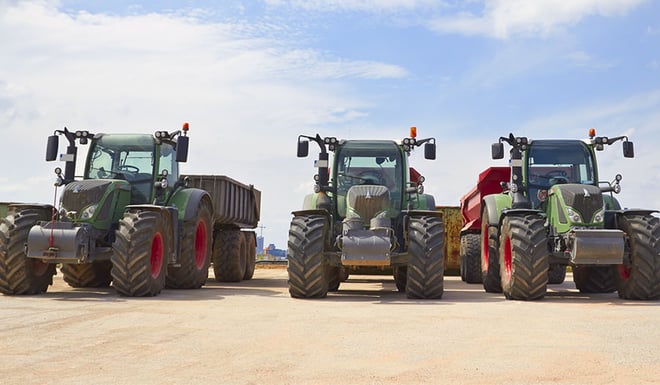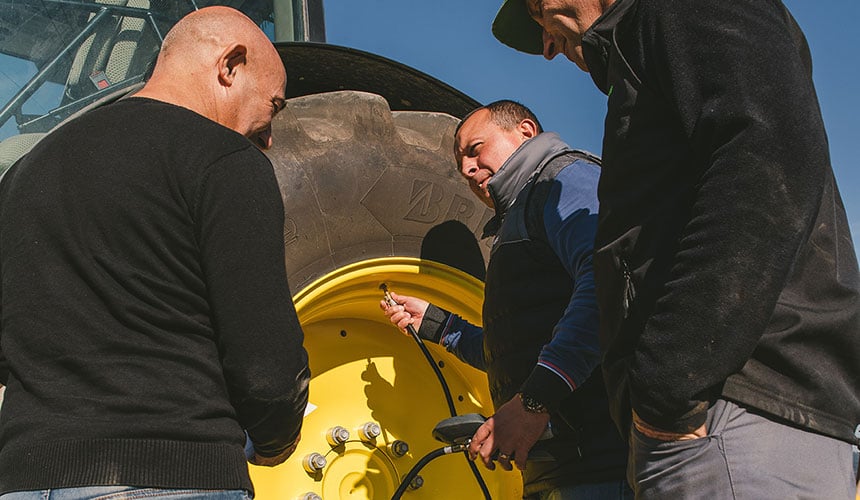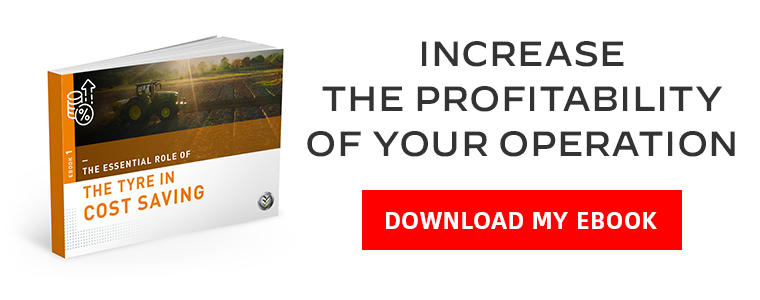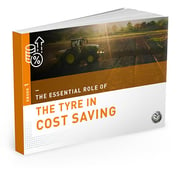After mechanisation costs, recurrent expenses linked to equipment certainly represent an expense item to which any member of an equipment sharing cooperative may turn to improve results at the end of the year. Better management of equipment can effectively be a real source of savings if you follow a few simple rules, or if the equipment is always used in the right conditions.
Agricultural tyres fall into this category of recurring costs, as they represent a considerable investment and may, with a minimum amount of time, care and control, allow you to gain hours of use and therefore reduce the frequency of tyre renewals at the level of the equipment sharing cooperative.
Here are the keys to optimising your agricultural tyres over time.
What tyre strategy can help improve your economic performance?
Your membership of an equipment sharing cooperative gives you access to the most recent, high-performance equipment, which is more powerful and therefore more efficient with the aim of improving productivity.
Everybody knows that top quality, powerful machines represent a real investment and are also a guarantee of success in your work, leading to a better economic performance, thanks above all to the sharing of the mechanisation costs.
As opposed to the idea of “spending less” which may be understandable when farmers buy their own equipment to reduce loan repayments and amortise idle time during which the machines are not used, in the framework of an equipment sharing cooperative, the most pertinent strategy is to “invest better” in high-tech and high-performance equipment, because each member only pays for their own share of the equipment use.
It is much more profitable to work fast and better with powerful, highly efficient tractors and wider implements, to minimise working time with the machines as much as possible and share the cost between even more members.
- To understand better: if you buy your car on credit but only use it one month a year during the holidays, it would cost you much less to hire a more powerful car for one month than to pay for an average car all year round.
Tyres are not an exception to this rule, they are essential components of your tractor which transmit engine power to the ground. They therefore contribute to your production capacity.
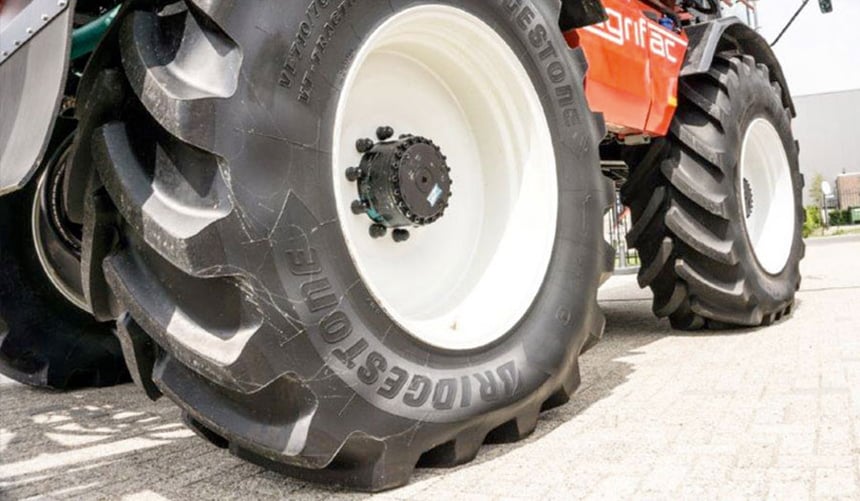 VF VT-TRACTOR tyres to reduce compaction and improve traction
VF VT-TRACTOR tyres to reduce compaction and improve traction
Top of the range VF tyres such as the VT-TRACTOR allow you to work in the fields at very low pressure and considerably increase the tyre’s contact patch with the ground and your tractor’s traction capacity.
Working at a low inflation pressure preserves the soil in your fields and avoids compaction, ensuring regular production for future yields.
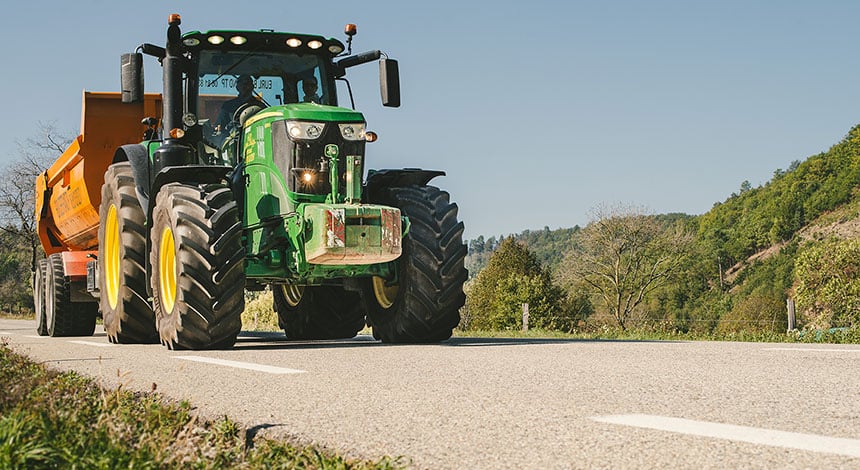 VX-TRACTOR tyre designed to resist wear
VX-TRACTOR tyre designed to resist wear
If you spend a lot of time on the road or have a mixture of crop farming and livestock breeding activities, tyres such as the VX Tractor were designed to resist wear using compounds which increase the resistance of the rubber and lugs made with 20% more rubber to ensure long-lasting tyres, less replacements over time and more savings for the cooperative.
How to manage agricultural tyre maintenance costs
The agricultural tyre budget is a major cost item and good knowledge and understanding of the equipment can help you save considerable amounts of money each year:
- reducing tyre replacements linked to wear,
- reducing fuel consumption,
- saving time thanks to better traction,
- preserving soil by avoiding excessive compaction.
1. Set in place a regular check-up routine to avoid beakdowns and tyre damage
Punctures aside, most problems are avoidable, because the damage is generally progressive and you can avoid it by regular maintenance and check-ups.
Here is a 10-point check-up that you can carry out in 10 minutes before taking the equipment from the cooperative in order to avoid incidents:
1. Is there any mark on anomaly on the tyre?
Visual inspection of the sidewalls and tread.
2. Is there any mark or anomaly on the rim?
Visual inspection of the rim: bead seat area.
3. Is there corrosion at the level of the bolts?
Check for the presence of corrosion on the wheel bolts.
4. Is the valve cap missing?
The valve protects the tyre’s weak point.
5. Are there foreign bodies present?
Foreign bodies at the level of the bead can cause damage.
6. Is there irregular wear to the lugs?
This may be caused by a problem with parallelism or excessive use on a crowned road or even use with a trailer whose axles are misaligned.
7. Are your tyres under or overinflated?
Pressure checks allow your tyres to resist the load.
8. Are there abnormal vibrations when driving?
Often the result of misalignment which damages tyres.
9. Is there a problem with directional stability?
May also be caused by a problem with parallelism.
10. Is there sway or abnormal bouncing?
Most likely a tyre mounting error, out-of-roundness of the rim or a non-concentric tyre.
All these rapid checks help detect in time the signs which will allow you to avoid incidents during operations. This could immobilise your tractor for several hours and require emergency breakdown services with all the related costs, and in the end a major expense which could have been avoided or repairs carried out rapidly and easily at the cooperative before taking out the equipment.
2. Ensure better management of pressure
Incorrect tyre pressure or using an average inflation pressure permanently will lead to rapid wear and result in the premature replacement of your tyres.
Adjusting tyre pressure is essential to increase the lifespan of agricultural tyres which are placed under great strain: load, type of soil, speed, overheating… Adapting the tyre’s capacity by adopting the pressure which corresponds to each situation allows you to:
- Control slip to preserve your soil
- Limit soil compaction
- Limit wear and extend tyre life by 20 to 30%
- Manage fuel consumption and reduce costs
- Optimise traction to save time.
3. Spread good practices within the cooperative
Sharing good practices such as the 10-point check-up illustrated above within the cooperative would improve all the members’ awareness of better tyre management techniques for the benefit of everyone.
As each member will effectively have to contribute to the cost of replacing tyres, it would be wise for everyone to apply these good practices which help avoid costly call-outs and gain many hours of use by limiting wear, for all the cooperative’s agricultural tyres.
4. Use equipment eco-responsibly
Using shared equipment involves greater responsibility in order to keep the possibility of benefitting from powerful, efficient and well-equipped machinery over time.
To preserve tyres, reducing speed in all circumstances brings only benefits and the few minutes saved on the road between two fields does not justify a budget of several thousand euros a year to replace a set of tyres.
The benefits of reducing speed:
- Less fuel consumption
- Possibility of increasing the load by adapting inflation pressure if you have VF tyres
- Reduced tyre wear
- Reduced risk of accidents on the road
5. Opt for a better management of tyres
Each activity is different and within the same equipment sharing cooperative certain members have more field crops and others more activities linked to livestock farming. In the same way as there is equipment devoted to each type of operation, there are tyres which have been developed for different uses, with a specific internal structure which improves performance if the tyres are mounted on the right equipment for the right activity.
If the equipment sharing cooperative has a tyre mounting workshop and the right equipment for mounting and dismounting tyres, it is often more cost efficient to have several sets of tyres ready for use, already mounted on the rims and to swap these sets of tyres to correspond with the activity to be carried out by the cooperative member, thus avoiding rapid wear linked to inappropriate use.
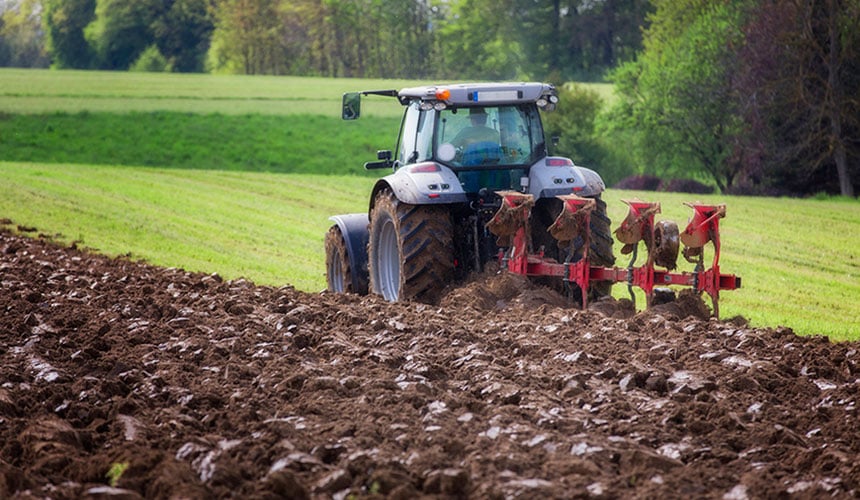 Low pressure tyres for field crop farming
Low pressure tyres for field crop farming
For example, VF tyres with very supple sidewalls such as the VT-Tractor which can work at a pressure of 0.6 bar will be perfect for field crop farming where the aim is to have optimal traction over a large distance while preserving the soil against compaction.
However, the VX-Tractor tyre which is more resistant, with sturdier sidewalls and 20% more rubber, will be ideal for mixed crop and animal farming due to its versatility and resistance to wear during handling work on hard ground in the farm courtyard.
The Bridgestone-agriculture.eu blog is written and administered by tractor tyre experts who are available to provide you with the advice you need on the subject of your agricultural tyres. They allow you to maximise your productivity with information on all subjects linked to tyres: Cheap tractor tyres — Technical data for agricultural tyres — Air pressure advice — Solutions to avoid soil compaction — Sprayer tyre pressure — Why and how to ballast your tractor tyres — When to use dual wheels — The mechanical causes of abnormal wear — Cheap agricultural tyres – etc.
To learn more and boost your farm's profits, Bridgestone-Agriculture is offering you a free, detailed white paper that explains the essential role your agricultural tyres play in your productivity.
Most people who read this article have also read some of the following articles:
- 5 essential techniques to optimise your agricultural tyres
- How your agricultural tyre footprint can help you detect a problem
- Manage your pressure to the ground to make your agricultural tyres last longer
- Dual mounting the best solution for optimal productivity
- Which agricultural tyres improve the tractive force of your tractor?
- Tractor tyres are crucial for successful ploughing
- How best to use your tractor tyres: wide or dual tyres
- Use forestry tyres for more resistence and motricity
- How your agricultural tyre footprint can help you detect a problem
- How to adjust wheel alignment and avoid wearing out my tractor tyres
- How your tractor tyres affect your fuel expenses
- Why your tyres’ speed index is primordial
This information is intended only to make you aware of the technical and functional aspects of agricultural tires and their use. It does not allow you to make a judgment or a definitive conclusion on a given problem. Only your agricultural tire expert is able to make a technical assessment and take a final decision, case by case.
Leave a
commentary
Your email address will not be published.
Required fields are indicated with *


